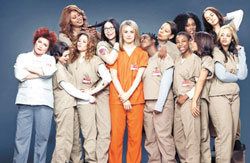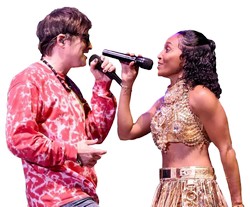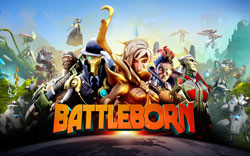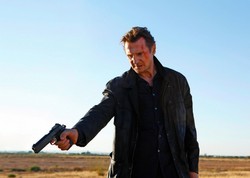Season One of “Orange is the New Black,” Netflix’s breakout dramedy about a women’s correctional facility, was raw, hilarious, and fearless – and it was just the beginning. The show’s second installment, available online as of June 6th, goes deeper into the lives of everyone’s favorite convicts as racial lines are drawn in the sand of Litchfield Penitentiary. The arrival of new inmates shakes up alliances, and it’s every woman for herself in the show’s highly-anticipated second season.
Originally based on the memoir of the same name written by Piper Kerman, “Orange” follows a fictional Piper Chapman (Taylor Schilling), and her transition from yuppie Smith graduate to fish-out-of-water in a woman’s prison. After carrying a suitcase of money across international borders for her drug smuggling then-girlfriend Alex Vause (Laura Prepon), Piper drastically changes course and spends the next decade building a picture-perfect life with dorky fiance Larry Bloom (Jason Biggs). When she is ultimately indicted for her criminal involvement in a drug ring, Piper is sentenced to fifteen months at a minimum security prison, where she confronts painful truths about herself and her relationships.
The series has received a lot of hype since its debut last year, and for good reason: Jenji Kohan and her writers took an unproven streaming service and delivered a powerhouse story that not only criticizes an archaic prison system, but digs deep to prove that we are all more than the bad decisions we make. “Orange” is unprecedented in its vast and diverse female ensemble, all of whom have backgrounds and storylines of their own. Its writing is sharp and funny in a completely unconventional way, and as recognized by the Academy with four Emmy nominations this past summer, it features some winning acting performances.
Last season left us with an agonizing cliffhanger, and a reminder that in prison, the stakes are always high. Piper’s character arc throughout “Orange’s” first chapter was a brilliant descent into the life of the rare female antihero, one who (despite her education, entitlement, and wealthy background) ends up in a bloody brawl outside in the snow during the prison’s Christmas pageant. After a year of torturous speculation (Did Piper kill Pennsatucky (Taryn Manning)? Will her sentence be extended?), Season Two mercifully provides some answers.
The premiere is an artfully-crafted bottleneck episode that takes place a few weeks after the incident and many miles from Litchfield. Helmed by returning director Jodie Foster, it’s equal parts dramatic and hilarious, and ends with a game-changing twist. It kicks off with Piper’s sudden release from solitary confinement and unceremonious shuttling onto a plane in the middle of the night. When she mysteriously arrives at a correctional facility in Chicago (after some entertaining conversations with seat-buddy Lolly, played by a wonderfully quirky Lori Petty), we’re left with more questions than answers. Fortunately, Alex is there to provide some information: no, Piper didn’t kill Pennsatucky, and no, this trip has nothing to do with her sentencing.
As it turns out, Piper and Alex are in Chicago to testify against a former drug lord, and in a bizarre twist of events, Alex’s testimony absolves her from the rest of her sentence. She walks free, and Schilling shows off her acting chops as Piper rattles the bars in front of her like a trapped animal.
With Prepon being unavailable for most of the season’s filming, the show shifts focus from its previous central love triangle and picks up back in Litchfield, where Piper has glumly returned (now as a self-declared “lone wolf”), and new inmates are causing trouble. There’s the eager and ever-so-annoying Soso (Kimiko Glenn), who looks to Piper for advice and acts as an important reminder of how far our leading lady has come, and Vee (Lorraine Toussaint), the falsely sweet drug dealer that manages to make the term ‘family’ sound like a threat. It’s Vee who drives the plot this season, as she faces off with Red (Kate Mulgrew) and Gloria (Selenis Leyva) for control of the prison’s contraband trade. Along the way she involves Taystee (Danielle Brooks) and her friends, and ignites a racial clash that leaves Litchfield bursting at the seams.
In typical “Orange” fashion, the linear narrative coincides with flashbacks of the inmates’ pre-prison lives. This season puts the spotlight on Suzanne’s (Uzo Aduba) adoption and childhood, Morello’s (Yael Stone) relationship with Christopher, Taystee’s surprising connection to Vee, and Rosa’s (Barbara Rosenblat) background in bank robbing.
Season Two also keeps up with subplots of the entire ensemble: Bennett (Matt McGorry) and Daya (Dascha Polanco) struggle to hide her pregnancy, and run into trouble when Mendez (Pablo Schreiber) declares his love; Pennsatucky is ostracized from her friend group, but finds a new bond with a misguided Healy (Michael Harney); and Larry (newly single) strikes up a questionable relationship with Piper’s best friend, Polly (Maria Dizzia).
With all of this packed into one season, it’s certainly fair to worry that maybe “Orange” is overdoing it – but Kohan and her writers juggle the ensemble so effortlessly that things rarely fall through the cracks. Season Two is as entertaining as ever, and contains some of the best-written dialogue of the summer. The plot does stall occasionally, and seems less structured without the Piper-Alex-Larry storyline to drive it. Though Piper’s transition from naive newbie to seasoned inmate has logically made her more of a secondary character this season, I’d like to see Season Three make better use of her narrative, and use her story as a framework for the rest of the plot.
There are a lot of impossible things about “Orange”: it’s got a ridiculous amount of characters, it doesn’t air on a network, and it takes huge risks in its tone, humor, and dialogue. Yet, not only does it work, but it thrives. It’s not without its flaws (this season was a lot less realistic, and occasionally lacked direction), but it’s refreshing, socially relevant, and incredibly entertaining. In the end, it just may be the best show not quite on television.
PHOTO TAKEN from popsugar.com




